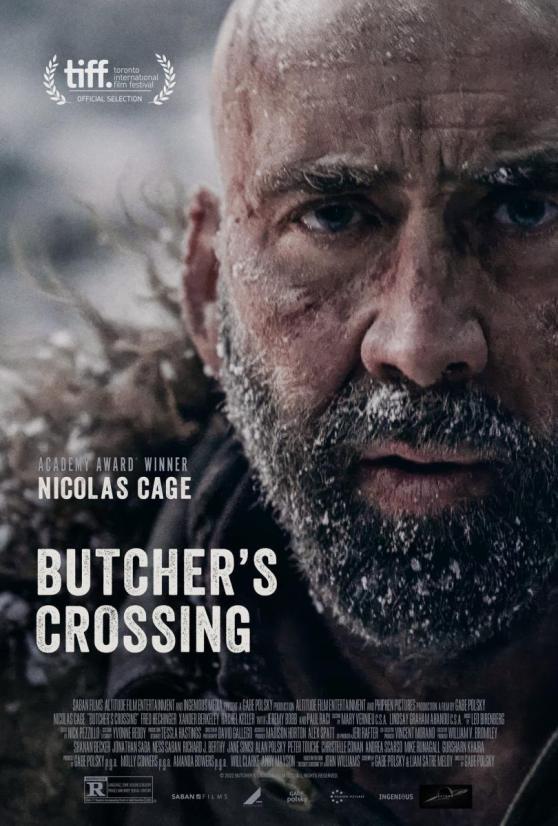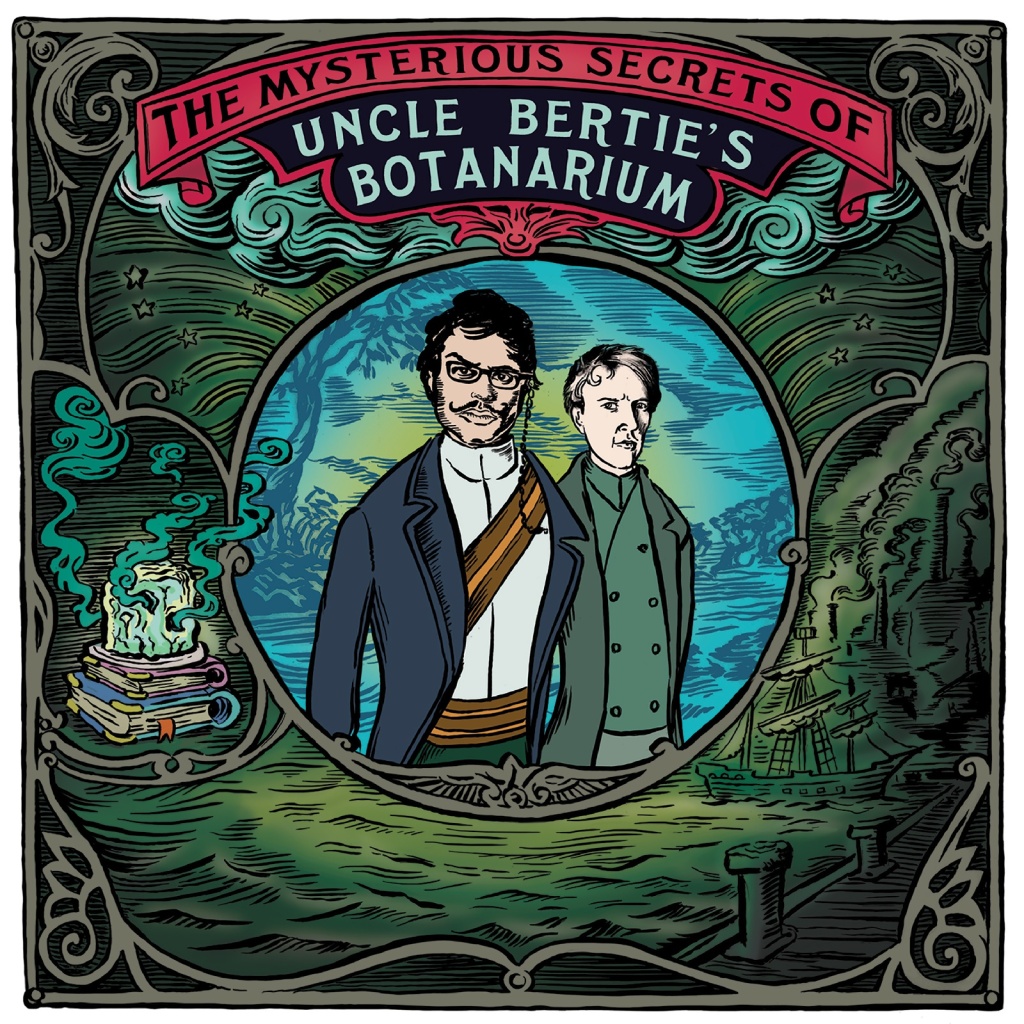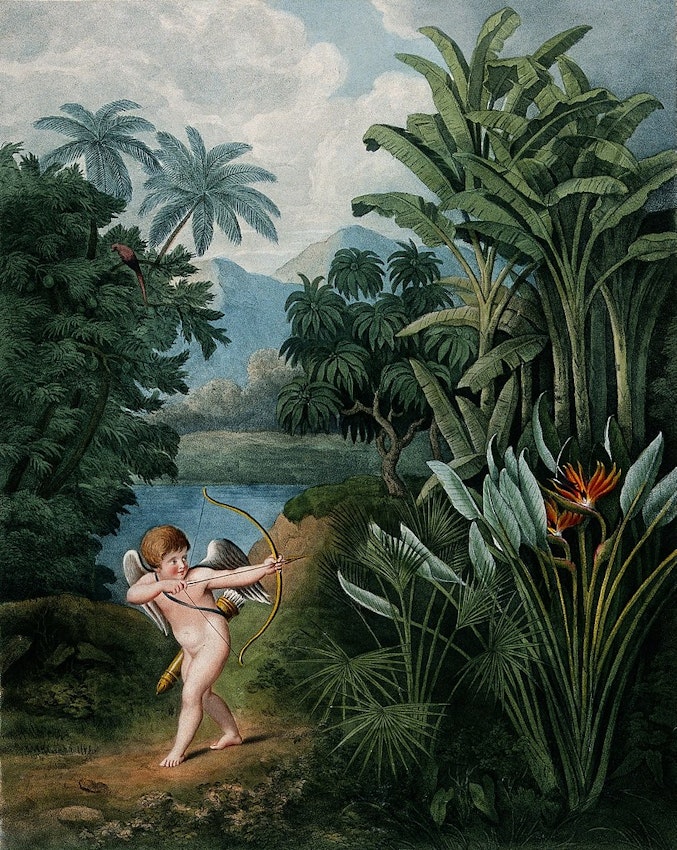Tag Archives: ecological economical complex
2344 – Butcher’s Crossing (2022)
timespace coordinates: 1874. Butcher’s Crossing, a tiny frontier town in Kansas built on the buffalo hide trade / Colorado wilderness

Butcher’s Crossing is a 2022 American Western drama film directed by Gabe Polsky in his narrative feature film debut, based on the 1960 novel of the same name by John Edward Williams. It stars Nicolas Cage, Fred Hechinger, Xander Berkeley, Rachel Keller, Jeremy Bobb, and Paul Raci. (wiki)
2277 – The Mysterious Secrets Of Uncle Bertie’s Botanarium (podcast 2016 series)
spacetime coordinates: an alternate imaginary British Empire – called “The Gravy Islands” and an Imaginary Indo-Pacific called “Boiling Ocean”

So happy friend/audio Jedi master Felix Petrescu (from famous electronica unboxed duo Makunouchi Bento) made me aware that this fabulous podcast by the likes of NZ The Flight of Conchords exists online for free (not for long though if I get it right). Jemaine Clement was the Vladislav to Taika Waititi’s Viago in that amazing vampire movie that all of you must have seen. This podcast made in 2016 is an incredibly funny silly madcap no-limits comedy piece. It is incredibly produced, sound designed, and written. It comes closest to the DE Hörspiel format I am familiar with and I rarely find it in French or EN. That said, please listen to The Mysterious Secrets of Uncle Bertie’s Botanarium with an open ear and an open heart. It is definitely my favorite and one of the best EN podcasts I have ever had the pleasure to listen to.

Why? Primarily because it is utterly delightful and full of botanical and natural history nonsense, yet a contemporary bastard of those very real colonial histories – when the search for the so-called ‘green capital’ by botanists and botanical hunters established the fortunes of Britain and ensured that the first pots made it to wet humid interiors of the Imperial Botanical Gardens of Kew. As Londa Schiebinger showed a while ago in the Carribean slave women brewed the ‘peacock flower’ into an abortifacient to ensure that no future children were born into slavery and exploitation. Such local herbal ethnobotanical lore was actively suppressed when the plants themselves got collected and traveled along the Middle Passage into Europe’s nurseries and botanical gardens. They arrived in our garden pots or plots as simple curiosities & ornamentals. That also speaks about why biological capital is still being extracted and privatized as we speak and speculated upon by biotechnological companies under capitalist regimes that grew out of the Ecological Imperialism of previous epochs.
The podcast is basically the quest of Lord Joseph Banks played by Jemaine Clement (based on the famous naturalist Sir Joseph Banks 1743-1820) and his manservant Solander (Lawrence Arabia aka James Milne who also provides the musical soundtrack) in a quest for the infamous Heaven’s Clover (a pun on Heaven’s Tree??). I´t satirizes the way early naturalists sexualized nature and genderized botanical science according to their mores, biases and values.
Botanical science was one of the few places where women were welcomed (but also only according to the Burkean binary beauty/sublime gendering of aesthetics, where women were supposed to be feminine, delicate and interested in delicate, fragile things). Botany was a harbor or research and scientific opportunity for women in a world that was as much patriarchal as it was elitist and classist. A bizarre example of applying sexual categories to classifying and identifying plants is the graphic sexual taxonomy developed by Carl von Linne in the 18th century (the inventor of the binomial classification system of species that is still in use today). Linne basically imagined that plants have penises and vaginas, and was very literal about it. He also used on purpose highly eroticized scientific language in order to recruit a wide net of botanical collectors. Others within the Calvinist redoubts of Edinborough tried to combat such “disgusting strokes of obscenity” (as Martin Kemp writes in a delightful article – Sex and Science in Robert Thornton’s Temple of Flora) in response to the perceived Linnean risky taxonomy. Robert Thornton had tried for example to de-sexualize plants and emphasize the logical and mathematical character of taxonomy that would thus regain the lost innocence of plants and allow women to pursue botany without embarrassment. And this is not a fiction.

Illustration showing “Cupid Inspiring Plants with Love”, in this case the Strelitzia reginae, or “queen plant”, a plate from Robert Thornton’s Temple of Flora (1807)
Suffice to say the podcast The Mysterious Secrets Of Uncle Bertie’s Botanarium is suffused with such botanical conundrums, unwittingly political, theological and erotic plants, butterfly-insect collecting naturalist manias, picaresque travels and Victorian battles. Railing against hedonistic dangerous pleasures and ‘immoral’ botanical heretics (such as those exhibited Uncle Bertie) is a constant feature of them. They are mad in the best of ways – being a full-range attack on British aristocracy and privilege, its conservative values, its totally ridiculous prejudice, homophobia, misogyny, xenophobia, classism, and racism. They are at the same time poking fun at everything – including scientific rigor – fully indulging in exhibiting an almost Swiftean dimension of describing the habits and orthodoxy of these alternate English snobs – such as milking (back tits of a cat!) cats. There huge amounts of Orientalism – with the visit to Batavia (a pun on actually existing Batavia in the former Dutch East Indies) actually producing a breaking down of crew morale and much botanical perversity. The Anderlugians are the sworn enemies of the Gravy Islanders (both a mixture of Spaniards and Germans? but also some sort of weirdo Communists or Socialists as well).
These podcasts offer something refreshing and cheeky in terms of historical accuracy or literary solemnity. They are both trashy and highly sophisticated, more akin to the exuberance of Douglas Adam’s Hitchkickers Guide Through the Galaxy (or Oceans in this case), completely different from the usual histories and at its best described as a deeply humourous take on the excesses of naturalism and natural history. There is also a lot of speculative botany at work and speculative ethnobotany involved as with a lot of the species collected since the times of Buffon that got endowed with very (Western!) human virtues or vices, serving at times as symbols of modernist artificiality, social decay and bio-matter for theories of degeneration. Even today with the recent legalization battles around Hemp, THC, and CBD health fads we are still in the middle of such fervent and frequent botanical reshuffling.
Thoroughly and utterly delightful!
2187 – #AfterExtractivism Berliner Gazette 2022 (video talks)
In today’s world of broken tech/content cultural cycles where oligarchic, tech billionaire or strongmen rule, unchecked megalomania and institutionalized greed tends express itself nowadays as “concern” about freedom or fighting against PC and censorship but ends in layoffs and users migrating from one temporary heaven to another. It is as Ada Palmer put – getting meta, a place where one used to tweet about various meltdowns – Twitter – is itself tweeting about its own meltdown. Well TW was itself stuck in the verbal and textual (if minute and 200 character limit) turn. People move to Mastodon and this is not something that should surprise us.
There is even talk about returning to Tumblr and who knows, maybe a renewed interest in worn-out formats such as WordPress. With that in mind I will post a few short talks on various subjects related to green transitions from fossil fuel as East /West manifold, climate justice, the Capitalocene, resource depletion and greenwashing from the #AfterExtractivism series an appendage to the Berliner Gazette. I participated with an article and a video in one on these, but I urge you to check the others too – they are dense, interesting and quite urgent. They range I said from the history of empires, system of sacrificial (based on human sacrifice) economy – of vegetal greases in the Atlantic Slave trade and British Industrial and Colonial history or today’s infamous petro-states of the Gulf and their futuristic imagery. They are quite short, ~ 10 minutes to 18, and quite to the point, so they might be worth your while, even if it’s talking heads – a situation I also often find annoying.
More info: after-extractivism.berlinergazette.de
Stefan Tiron 1989 / 2147
Connecting post-1989 worker struggles in Romania’s coal mining region with Captain Power and a group of guerrilla fighters who oppose the machine forces that dominate Earth in the 22nd century following the so-called Metal Wars, artist, author, and curator Stefan Tiron inquires in his contribution to the Berliner Gazette’s video talks series “After Extractivism” into the political potential of science fictional transitioning in the 1990s.
Max Haiven · Palm Oil
While Russia’s invasion of Ukraine has triggered a global shortage of sunflower oil, propelling palm oil to rise again, a critical look at the global history of the palm oil industry reveals both the imperial violence of extractive capitalism as a system of human sacrifice and the challenges for a transition into a just world, social thinker Max Haiven argues in his contribution to the Berliner Gazette’s video talks series “After Extractivism.”
Stoyo Tetevenski · European Green Deal
The case of Bulgaria reveals: what is sold as the ultimate way out – namely, the “green” transition – opens new spaces for accumulation. The cost of this is to be borne by society, especially by workers in old industries. Thus, the challenge is to advance post-capitalism, as environmental justice activist Stoyo Tetevenski argues in his contribution to the Berliner Gazette’s video talks series “After Extractivism.”
Manuela Zechner · Earthcare
While ecological and economic systems are collapsing, a battle for white supremacy is raging; it is not least a class war for (controlling) access to the shrinking living space on the planet. It is high time to counter this development with a radical politics of earthcare, as feminist researcher, facilitator, and artist Manuela Zechner
Katarina Kusic · The Yugoslavia Lesson
The suffering caused by extractive capitalism has people looking back to Yugoslavia’s modernization project. While aiming to dominate nature, it also created cooperative platforms for social togetherness, enabling sustainable ways of living and organizing economy.
Julio Linares · Climate and Debt
Fighting for debt cancellation and environmental justice in the Global South, the question is how we can wager our future on the legacies and claims of those who – then as now – have been plunged into existential hardship by the ecological-economic complex. In his contribution to the Berliner Gazette’s video talks series “After Extractivism,” economic anthropologist Julio Linares is looking for answers in Latin America.
Özgün Eylül İşcen · Gulf Futurism
After the Gulf boom propelled the growth both of the region and of oil-devouring economies in the West, new realms of capitalist expansion are being developed along the lines of green capitalism’s smartness mandate, ultimately reproducing the lasting systemic crisis of which Dubai is somewhat representative, media theoretician Özgün Eylül İşcen argues in her contribution to the Berliner Gazette’s video talks series “After Extractivism.”